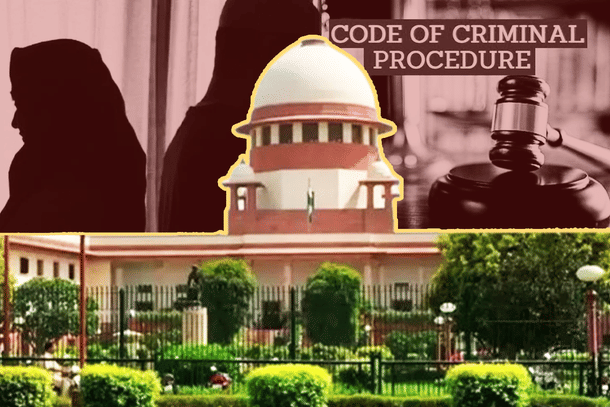Commentary
Supreme Court Hearing A Case That Can Practically Undo The 'Shah Bano' Travesty — Here's All About It
Abhishek Kumar
Feb 19, 2024, 06:49 PM | Updated Feb 20, 2024, 11:39 AM IST
Save & read from anywhere!
Bookmark stories for easy access on any device or the Swarajya app.


In 1986, the Rajiv Gandhi government passed a law that practically upturned a Supreme Court ruling on maintenance for Muslim women after divorce.
The Shah Bano Judgement
In 1978, a Muslim woman named Shah Bano filed a maintenance petition before a Judicial Magistrate in Indore.
Her husband Mohammed Ahmad Khan, a lawyer, had divorced her by pronouncing triple talaq. The maintenance petition was filed under Section 125 of the Code of Criminal Procedure, 1973. It makes a man liable for maintenance of his wife during marriage as well as after divorce, in case a woman can’t support herself. Section 125 is a secular provision applicable to men of all religious affiliations.
The maintenance petition was challenged by her husband claiming that Muslim Personal Law mandates maintenance only till the period of iddat, which is around three months.
The All India Muslim Personal Law Board (AIMPLB) also supported the husband stating that not doing that would violate The Muslim Personal Law (Shariat) Application Act, 1937. AIMPLB effectively said that in the case of Muslims, Shariat should prevail over the law of the land.
The case eventually reached the Supreme Court and the apex court did not agree with this argument. It even criticised AIMPLB in its judgement.
Y.V Chandrachud, then Chief Justice of India (CJI), upheld the High Court’s decision to grant Shah Bano maintenance under Section 125 of CrPC. The judgement set the precedent of secular law prevailing over personal law provisions of different religions.
A huge uproar among the fundamentalists of the Muslim community followed.
Eventually, the Rajiv Gandhi government brought The Muslim Women (Protection of Rights on Divorce) Act, 1986 (MWPRDA, 1986). The 1986 Act again limited the responsibility of the husband only till the period of iddat.
Confusion over applicability
MWPRDA, 1986, was challenged in the Apex Court. In the Danial Latifi case, the Court though held it Constitutional but gave a liberal interpretation of the maintenance provision by extending it beyond the iddat period.
In the Iqbal Bano case (2007), the Supreme Court said that Muslim women can claim maintenance under CrPC as the MWPRDA, 1986, is applicable only to divorced women.
Few years later, the Supreme Court in the Shabana Bano case held that even if the Muslim woman is divorced, she can claim maintenance under Section 125 of CrPC. It reiterated its stand in the Shamima Faruqui case (2015).
Even as these cases were adjudicated upon by the apex court, confusion still prevailed and prevails over which law will take precedence in case of a conflict.
Mohd. Abdul Samad Case
It re-emerged as a thorny issue in yet another maintenance case. A Telangana man named Mohd. Abdul Samad was ordered to pay Rs 20,000 as maintenance to the woman he had divorced, by a family court. The order was passed under Section 125 of CrPC. After he approached the High Court, the amount was halved, but even the High Court held that "several questions are raised which need to be adjudicated".
The man has now approached the Supreme Court stating that provisions of MWPRDA, 1986 will prevail over Section 125 of CrPC as the CrPC is a general act.
The Apex Court has appointed senior counsel Gaurav Agarwal as amicus curiae for assisting the Court.
UCC route or not?
There are two routes the case can go from here:
1. The Supreme Court can decide that provisions of MWPRDA, 1986 will prevail over Section 125 of CrPC. This will effectively uphold the legislative action of the Rajiv Gandhi government of 1986
2. The Supreme Court may decide to uphold the precedence of CrPC over provisions of MWPRDA, 1986.
It can be argued that such a decision will be more in consonance with the principle of a single law system prevailing over all citizens. A citizen's religion won’t have any bearing on the legal regime that applies on him, which is the essence of Uniform Civil Code.
If it's the latter decision, it could, unintentionally of course, create a narrative in favour of a uniform civil code by effectively nullifying the Act that stood as a symbol of appeasement.
The matter was to be taken up today, 19 February, but could not be heard on the day.
Abhishek is Staff Writer at Swarajya.





